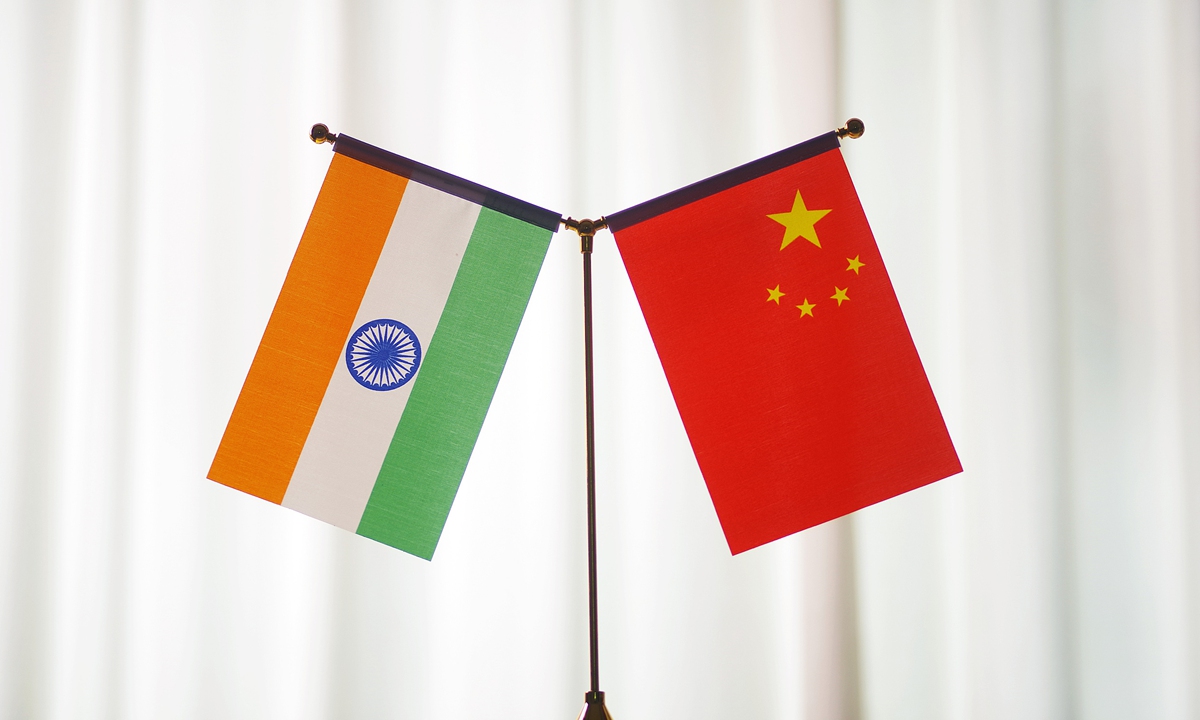China-India FM meeting 'last chance' for peaceful solution
By Yang Sheng Source: Global Times Published: 2020/9/10 22:30:39
China should not further tolerate India: experts

China India Photo:VCG
Chinese State Councilor and Foreign Minister Wang Yi and his Indian counterpart Subrahmanyam Jaishankar attended the Shanghai Cooperation Organization (SCO) foreign ministers' meeting in Moscow on Thursday, and are likely to have a face-to-face meeting. Chinese experts said this could be the last chance for the senior officials of the two sides to peacefully settle border tensions before winter.
A meeting would be significant for them to solve border tensions, and with Russia's mediation, the two members of the SCO are likely to realize an agreement in Moscow and de-escalate tensions. If the meeting fails to reach a positive result, or if the two sides cannot execute the agreement at the front line, this could be a dangerous signal that China and India are unlikely to solve the crisis peacefully, analysts said.
Ahead of his departure for Russia on Tuesday, Jaishankar emphasized the need for political contacts to reduce tensions and end the stalemate in the disengagement process along the LAC, Hindustan Times reported. The standoff goes against all understandings on border management dating back to 1993, and the serious situation calls for "very deep conversations...at a political level," he said.
Lin Minwang, deputy director at the Center for South Asian Studies of Fudan University, told the Global Times on Thursday that in India's political system, the minister of external affairs decides external issues, which means Jaishankar is more senior than the country's defense minister, and the meeting between Wang and Jaishankar would be more important than the previous meeting between the two defense ministers in Russia.
In a bilateral meeting, China and India would show their bottom lines to each other, so that they can avoid miscalculations and underestimation, Lin said.
"This is the last chance of face-to-face meeting between the two countries' senior officials before winter comes. India has high expectations that the meeting would solve the crisis. But to what extent its troops in the frontline could execute the agreement and avoid provoking Chinese troops remains the question," said a Chinese scholar on Indian studies who asked for anonymity.
Although both sides want to minimize the damage and avoid conflict, they are unlikely to make more compromises, as India is facing extreme domestic nationalism, and ending the crisis peacefully with no gain could be considered a failure, while China has no space to make compromises on sovereignty, he said, noting that the possibility for a peaceful solution is fading.
The weather in the Ladakh region is the biggest challenge for both sides to continue the stand-off, as the temperature will fall to minus 25-30 degrees in winter, and Chinese analysts said that Indian troops have occupied many locations with no human activity in the region. So making sure that Indian soldiers will not die or get injured from their poor logistics supply system in winter is a question.
In the June 15 Galwan Valley clash, 20 Indian soldiers died, most of whom were frozen to death after being injured due to poor medical conditions. India should at least be humanitarian to avoid more casualties and stop the provocation, said Hu Zhiyong, a research fellow at the Institute of International Relations of the Shanghai Academy of Social Sciences.
For China, the PLA's logistics system is much more advanced, and even during winter, China can maintain more troops than India, Hu said.
No more tolerance
Before the latest round of border tensions, India imposed unfair sanctions against Chinese firms and apps in India, and caused financial losses to Chinese companies, as well as Indian users and clients. But the Chinese government has exercised restraints without taking retaliatory moves. Chinese experts said this proves that China has already shown its sincerity to minimize the damage to bilateral ties, and tolerant to India's provocation.
"But unfortunately, India didn't return the favor, and even made more trouble and created more tensions and expects to force China to further compromise by breaking agreements to de-escalate border tensions. This has truly infuriated Chinese decision-makers, military, experts and scholars, as well as the public, and China won't tolerate India anymore. A series of provocations proved that tolerance to India is useless in exchange for peace," Lin said.
Song Zhongping, a Chinese military expert, told the Global Times on Thursday that if both sides fail to reach a peaceful solution, China should not wait any longer, and solve the crisis militarily before winter, because if China allows Indian troops to stay in the Chinese side of the Line of Actual Control (LAC), "the small problem will become a big problem."
Indian troops will normalize their illegal presence in the region on the Chinese side of the LAC regardless of non-combat casualties in winter, and use diplomatic measures to gain more sympathy from the international community"by making China look like a trouble maker." If the foreign ministers' meeting brings no de-escalation, China needs to prepare for a military solution, Song stressed.
Posted in: DIPLOMACY